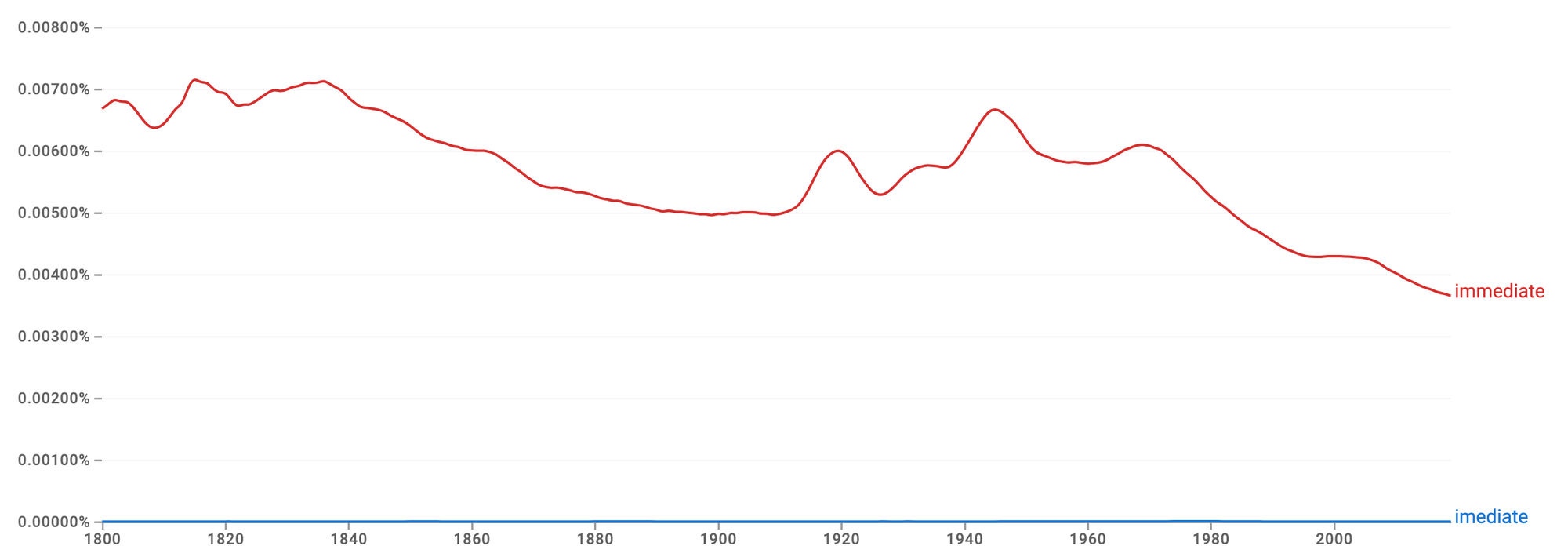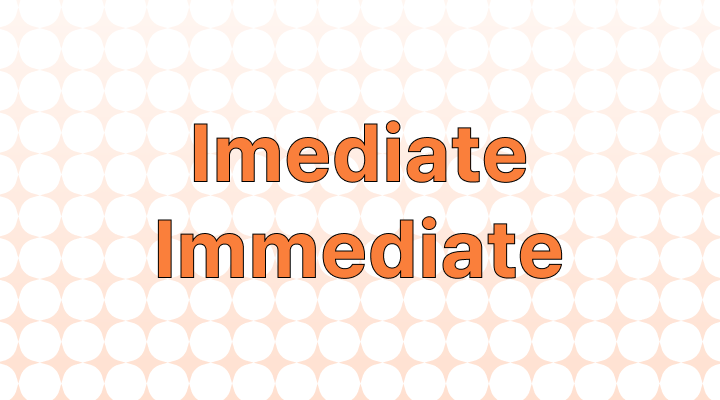- "Imediate" is an incorrect spelling of the word "immediate."
- "Immediate" refers to something happening or being done without any delay, occurring right away or at once.
❌ She responded to the urgent email with imediate action, addressing the concerns promptly.
✅ She responded to the urgent email with immediate action, addressing the concerns promptly.
In this context, "immediate" describes the swift and prompt action taken in response to the urgent email without any delay.
What does "immediate" mean?
"Immediate" has a few different layers of meaning, depending on the context. Here are some ways to think about it:
1. Happening without delay: This is the most common meaning of "immediate." It describes something that happens right now, instantly, or with no time in between. Think of a car slamming on its brakes – the stop is immediate.
2. Close in time or space: This meaning suggests something is very near or happening soon. A meeting that starts in five minutes or a house located "just in the immediate vicinity" would fall under this category.
3. Directly related or affecting: This implies something is connected to and impacting something else right away. An "immediate cause" of a problem directly results in it, and an "immediate need" requires urgent attention.
4. Acting without hesitation: This describes someone who is quick to respond or take action. An "immediate reaction" is impulsive and happens without much thought.
5. Direct and unmediated: This emphasizes closeness and lack of interference. "Immediate contact" means no one else is involved, and an "immediate answer" comes straight from the source.

The use of "imediate" and "immediate" over time
The Ngram graph below shows how often "imediate" and "immediate" have been used from the 1800s to the 2000s. "Immediate" has seen relatively steady use despite some decline, while its misspelling "imediate" has always seen nearly zero use.

How to pronounce "immediate"
In both British and American English, "immediate" is pronounced like "uh·mee·dee·uht".
This is just the standard pronunciation, and there may be slight variations depending on regional accents and individual speech patterns.
Why would we misspell "immediate" as "imediate"?
- Typo and Phonetic Influence: The placement of "e" and "i" next to each other on a keyboard may lead to a typo, and the phonetics might not strongly emphasize the "e" sound, leading to the misspelling "imediate."
- Similar Word Patterns: Individuals might mistakenly associate "immediate" with words that follow a pattern of having a single vowel followed by a consonant, such as "severe" or "complete." This false connection could lead to the misspelling "imediate" by assuming a similar pattern in spelling.
Other common misspellings of "immediate"
- Imeediate
- Immediat
- Imidiate
- Immedate
- Immeadiate
Example sentences of the misspelling of "immediate" as "imediate"
- It's crucial to recognize that "imediate" is not the correct spelling; the accurate term is "immediate."
- When describing swift action without delay, avoid the misspelling "imediate" and use the correct term, "immediate."
- Using "imediate" may lead to confusion; ensure you spell it correctly as "immediate" in your communication.
- Correct your spelling to "immediate" instead of "imediate" to accurately convey the idea of happening without delay.
- Don't compromise clarity by using the incorrect spelling "imediate"; the right term is "immediate."
Example sentences of "immediate"
- The fire department responded with immediate action to extinguish the flames and prevent further damage.
- Upon receiving the urgent news, the team took immediate steps to address the issue and mitigate potential risks.
- An immediate decision was necessary to avert a crisis and ensure the safety of everyone involved.
- The CEO called for an immediate meeting to discuss the unexpected changes in the market and formulate a strategic response.
- In emergency situations, quick and immediate medical attention can make a significant difference in outcomes.
- The teacher provided immediate feedback to the students, helping them understand and correct their mistakes.
- The company implemented an immediate recall of the defective products to prevent any harm to consumers.
- The new software update resulted in immediate improvements in system performance and efficiency.
- The diplomat emphasized the need for immediate diplomatic measures to de-escalate the tension between the two nations.
- The customer service representative assured the frustrated customer of an immediate resolution to their issue.
🖊️ "At Your Earliest Convenience" Meaning and Examples
🖊️ How to Use Scarred vs. Scared: What's the Difference?
Synonyms for "immediate"
- Prompt
- Instant
- Swift
- Quick
- Timely

Want to sound like a native speaker?
Engram’s AI-powered grammar checker makes your English sound like a native speaker’s, suggesting natural English expressions on top of fixing grammar, spelling, punctuation, word order, and vocabulary.

References:














